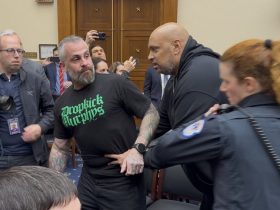The left’s favorite utopian scheme is hitting a wall of reality. Universal Basic Income (UBI) programs, long promoted by progressives and Silicon Valley billionaires as a silver-bullet solution to poverty, are failing spectacularly, and even their own supporters are being forced to admit it.
Put simply: studies consistently show if government pays people to do nothing, they end up choosing to then do nothing, and the free money does not increase their quality of life.
According to reporting by Kelsey Piper highlighted by The Argument and summarized on Substack by S. T. Karnick, multiple gold-standard scientific studies, randomized, controlled, and large enough to remove doubt, show that UBI simply does not work.
Piper argues, “Homeless people, new mothers and low-income Americans all over the country received thousands of dollars. And it’s practically invisible in the data. On so many important metrics, these people are statistically indistinguishable from those who did not receive this aid.”
The Political Push for UBI
The idea of simply cutting everyone a government check has been pushed into the mainstream over the last decade. Former Democratic presidential candidate Andrew Yang made UBI the centerpiece of his 2020 campaign, calling it the “Freedom Dividend” and promising $1,000 per month for every American adult. Members of the progressive wing of Congress, such as Alexandria Ocasio-Cortez, Ilhan Omar, and Rashida Tlaib, have floated pilot programs or endorsed the idea in principle.
On the tech side, billionaires Elon Musk, Mark Zuckerberg, and Jack Dorsey have all spoken favorably of UBI as a way to deal with automation or as a supposed social safety net of the future. Their backing gave the movement a cultural megaphone.
Musk has said that the technological benefits of the “A.I. revolution” will guarantee the public “universal high income.”
Other than small, local, pilot programs testing UBI, most governments have not yet adopted it on a wider basis. The ruling party in South Africa, the Communist-linked African National Congress or “ANC,” which is alleged to be pushing an ongoing genocide against the white minority in the country, is proposing to convert its COVID social relief grants into a full UBI within two years. If successful, it could mark the first national-scale adoption of UBI.
Vox has said UBI is ‘not radical’ and, despite what the science shows, says people would be ‘better off’ and the only consequence would be ‘less poverty and higher taxes.’ Vox discusses this left-wing fantasy as a permanent solution to poverty simply held up by privileged rich people who don’t want to pay higher taxes.
Left-wing groups have said efforts to ban UBI payments ‘undermine American values’ and falsely claim every study validates their conclusion that handing out money to the poor with no strings attached, results in better policy outcomes.
Far-left political figures like former President Barack Obama, former Treasury Secretary Lawrence Summers, and former Speaker of the House Paul Ryan, have complained about the potential cost of UBI policies, saying that they do not solve enough of the problem to justify their costs.
Noted Economist Thomas Sowell, in interviews, has also warned that UBI programs that promise to replace the onerous costs of administering the welfare state, will, in fact, never be removed. Instead, he warns, UBI will simply end up as another program in addition to all the others.
Iowa, Arkansas, and Idaho have passed legislation to ban cities and counties from implementing their own basic income programs.
Yet the Results as Studied: Failure Across the Board
In trials and studies, recipients were given thousands of dollars in U.S. trials. The hope was that this free money would cause their lives to improve and their measurable life’s quality to increase. But the data is crystal clear that it did not work:
No improvements in mental health or stress levels
No gains in physical health or sleep
No better education, jobs, or child development outcomes
No increase in overall life satisfaction
At best, participants worked a little less, but that did not make them any happier. Early stress relief from the cash vanished quickly.
Studies from last year have also shown, in Western countries, that such programs even when well-administered, lead to a reduction in the labor force participation rate. The reduction in work typically correlated with the amount they were being given by the government, meaning that when participants were given $500 from the government, they reduced their working hours so that they typically earned $400 less, netting an average of $100 in greater net wealth.
Media Cover-Up
The most shocking part is not just the failure of UBI, but the media’s coordinated effort to hide its failures. As Karnick notes, these damning results are consistently obscured by journalists and activist researchers desperate to salvage their ideological dream. Press releases spin “tiny positives” while ignoring the overwhelming null results.
Take Denver’s Basic Income Project. Reports boasted of “significant improvements in housing outcomes.” In reality, homeless people receiving $1,000 a month were barely more likely to find housing than the control group.
A Noble Lie
Karnick quotes study author Sarah Miller, who admitted that when the results are disappointing, reporters are not eager to cover them. “People aren’t interested in reading null results,” she said. This leads to what Piper, the analyst cited in the piece, calls “noble lies,” a culture where the media deliberately conceals reality to protect progressive narratives.
Defenders of UBI are now trying to shift the proposals away from wide-implementation, and, instead, focus on smaller societal segments such as pregnant women, domestic violence survivors, or people recently released from prison.
UBI proponents are also now trying to say that the policy works in poor countries, but that rich countries have ‘complex’ problems that money alone cannot solve.
The evidence shows UBI does not deliver on its promises. It does not improve lives, it does not fix poverty, and it does not justify the trillions of dollars in redistributive spending that Democrats and their allies in Big Tech dream of funneling into such schemes.
As Karnick concludes, the honest approach is to let the truth come out, however uncomfortable it may be: simply giving money to the poor will not make them rich.
The post Studies Show ‘Universal Basic Income’ Is a Bust, Provides No Benefit, Even Advocates Admit It appeared first on The Gateway Pundit.











